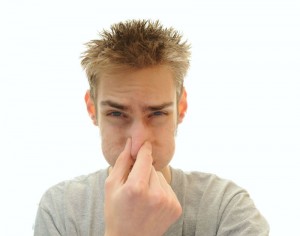Your Stinky Chimney: Chimney Odors and What to Do About Them
You want your fireplace to offer the ambiance you expected when it was installed, along with efficiency and safety to boot. That isn’t too much to ask. When your chimney stinks it’s not only  inconvenient, but it also points to a bigger problem that should be dealt with right away.
inconvenient, but it also points to a bigger problem that should be dealt with right away.
What a Stinky Chimney Means for You
A chimney that is working properly shouldn’t stink–if it does, there is an issue inside. By identifying the type of smell, it can be easy to diagnose.
- A musty, dank odor means there is moisture in the chimney. When moisture gets into the chimney it mixes with soot, resulting in an unpleasant odor. This is a common cause of a stinky chimney, and homeowners should be aware of this and call a professional right away because water can wreak havoc on your chimney .
- A singed, smokey odor means there is a draft problem, or some bad burning habits on the part of the homeowner. If there is a draft problem it might be as simple as opening a window in another part of the house to replace air in the house. However, it can be a bigger problem, like a liner that is the wrong size, or a chimney that is the wrong height. If this is the case, the odor will persist until the problem is fixed, and these repairs should be done by a professional. If the odor is the result of poor burning practices, it is the easiest fix. The only fuel that should be burned in your fireplace or appliance is exactly the fuel it is designed for.
If you burn cord wood, you should only burn seasoned wood that has been cut, set aside, and dried for a number of months before burning. Burning wood that is not dried properly can cause incomplete burning which can contribute to draft problems as well as soot buildup. Also, trash and other items should never be burned in the fireplace. These items do not burn completely and pose a threat to the chimney system and the home.
What You Can Do For a Stinky Chimney
- Call a Professional
Even if you are able to correct the problem by cracking a window to improve the draft, or by using the proper wood, you should call a professional and have your chimney checked out. Depending on how long the odor has been present, there may have been damage caused to the chimney. For instance, both a draft problem and improper fuel can cause creosote buildup on the flue lining. This will continue to stink, as well as may cause flue blockage, and threat of fire.
If the odor was caused by moisture in the chimney a CSIA Certified Chimney Sweep® (CCS) can assess the cause and the damage. The chimney may need to be relined, resurfaced, or waterproofed to prevent further damage.
- Remember Maintenance
The Chimney Safety Institute of America (CSIA) recommends regular chimney sweeps and annual chimney inspections to insure the chimney system is operating at it’s best efficiency and safety. These are preventative steps that you can take as a homeowner to prevent costly damage later.
To learn more about how your chimney works and reasons why your chimney isn’t working, visit with a professional today. Chief Chimney Services is available for consultation, chimney sweeps , and inspections. Schedule your appointment online today.

